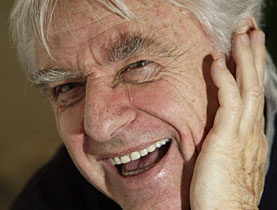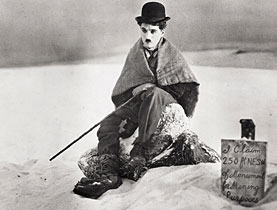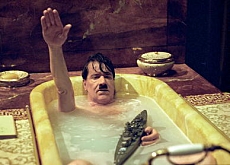Swiss comedian Emil grapples with languages

Switzerland's arguably most popular living comedian Emil Steinberger tells swissinfo the best way to capture the audience is to hold a mirror up to people.
Emil, as he is known, turns 75 on Sunday and has lived on Lake Geneva since his return from New York in 1999.
A native of the central Swiss city of Lucerne, the former employee of the Swiss Post first appeared on stage as a comedian at the age of 20.
In the 1960s he ran a fringe theatre and managed two cinemas in Lucerne before becoming a professional comedian in German-speaking Switzerland, neighbouring Germany and Austria.
His biggest successes were when he toured the country with Switzerland’s national circus Knie, and his role as official in charge of checking citizenship requests in the all-time classic film The Swiss Makers.
Steinberger disappeared from the stage for several years when he moved to New York in 1993. But he never gave up acting and reading publicly from his numerous books.
swissinfo: How does it feel to turn three times 25?
Emil Steinberger: It makes you think. Well, for the first time I realise that my whole life has been marked by my ambition to entertain people.
As a choirboy or in school I always liked to play the clown. One day the teacher asked me to leave the class because he couldn’t keep a straight face.
There wasn’t too much to laugh about during the nine years I worked as an employee of the Swiss Post. Except at union meetings where I was in charge of cheering up the delegates.
I only lasted nine years behind the Post Office counters because the work there didn’t leave me enough time for my hobby as a comedian, which later became a full-time occupation.
swissinfo: People in the French-speaking part of Switzerland still see you as the German speaker who made them laugh. Why did you decide at the time to make the difficult step of crossing the language divide?
E.S.: I was warned that a French-language audience did not like Swiss Germans speaking French.
But a French-language comedian, Lova Golovtchiner, asked me to translate one of my sketches for a show on television in Lausanne.
I did it for him really. But when the cameramen laughed so hard that they had trouble keeping the picture in focus it dawned on me that my stage presence worked in French just as well.
swissinfo: The awkward French you use on stage, how much of you is in it?
E.S.: I wrote my texts in Swiss-German dialect to begin with. Then I translated the text into French and had two other people do their own translations. The version for the sketch was a blend of all three.
I didn’t aim for a refined French or something vulgar because I didn’t want to skate on thin ice.
It had to be very basic to make the audience believe Emil really spoke French like this.
swissinfo: And what did you do for the shows in neighbouring Germany?
E.S.: It was very similar. As you might know the Swiss Germans are not too keen to speak standard German. It is like a foreign language for most of us.
A tour of Germany meant panic and stress. Standard German is another language, the grammar is different and even the body language does not work the same way.
swissinfo: Were you also seen as a kind of exotic animal when you toured neighbouring Germany with your show?
E.S.: The Germans laugh at us because they perceive us as a bit ponderous and we speak half as fast as they do.
But oh, they adore our dialect. It’s music to their ears, a language with a melody, not as harsh as their own.
They poke fun at us, but they are really jealous about little Switzerland. This comes out best when they laugh about a Swiss who jokes about his own country.
swissinfo: Then there was the break in 1993 when you left Switzerland to live as an unknown Swiss in New York for six years. An interesting experience, but also tough…
E.S.: I became aware of what it means to live abroad and not to know the local language well enough.
It makes it hard to meet other people and blend in with them because there is the fear that you cannot express your feelings.
You become somebody not particularly interesting for others, but there is nothing wrong with that. I now know what it feels like to be a stranger.
swissinfo: When you returned to your native Switzerland why did you choose to settle in the French-speaking part of the country, near Montreux?
E.S.: I wanted to show Switzerland to my German wife, Niccel. We started off in the Lake Geneva region, which I knew from my tour with Circus Knie.
In Territet we came upon the statue of Sissi, a famous Austrian empress who spent much of her time in the region. Then we noticed that there were apartments for sale in the building right next to the statue.
We have been in Territet since 1999, but we go to the German-speaking part of Switzerland on a regular basis.
I miss my mother tongue. When we go to the theatre in the French-speaking part, the audience is laughing while the two of us are still trying to mentally translate what was said on stage.
The same thing happens to us in the cinema. I don’t really get it if the French-speaking actors rattle away very fast.
swissinfo: The French language audience is used to a tradition of coarse comedy. But you are different. What’s your definition of comedy?
E.S.: The art of comedy touches your heart and soul. I’m not really a comedian in today’s sense of the word, I’m more of a fringe stage actor.
It’s always been out of the question for me to make sexual jokes, even today. What still works best is to act out scenes where the audience recognises itself.
The best recipe is when people see something that moves them, something they have experienced themselves.
swissinfo-interview: Marc-André Miserez
Switzerland has four national languages. Nearly two-thirds of the Swiss population live in the German-speaking part of the country.
The German in everyday use in Switzerland is a variation of different dialects. It can differ considerably from standard German spoken in neighbouring Germany.
About 20% of the population live in French-speaking Switzerland, mainly in the west of country, while a minority of about 6.5% are native Italian speakers in the Ticino region and 0.5% in southeastern Switzerland speak Romansh.
Emil, as he is generally known, trained and worked as an employee for the Swiss Post until the age of 27 when he re-trained as a graphic designer in Lucerne.
He began comedy shows in 1953 and founded a fringe theatre and ran two art cinemas in Lucerne together with his first wife, Maya.
Emil became famous when he toured Switzerland, including the French-speaking part of the country, as a comedian for the national circus Knie in 1977 and starred in the film The Swiss Makers.
In the 1980s he started a stage programme in French with his character Corporal Schnyder. But he rejected an offer to work in Paris.
In 1987 he quit the stage to shoot a few promotional films before he and his second wife Niccel went to live in New York in 1993.
They returned to Switzerland six years later to run a publishing house for his books, CDs and DVDs.
Emil regularly reads from his books at public events in Switzerland, Germany and Austria. So far he has done more than 400 readings and public sketches, others are scheduled for this year.

In compliance with the JTI standards
More: SWI swissinfo.ch certified by the Journalism Trust Initiative












You can find an overview of ongoing debates with our journalists here . Please join us!
If you want to start a conversation about a topic raised in this article or want to report factual errors, email us at english@swissinfo.ch.